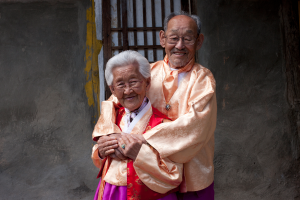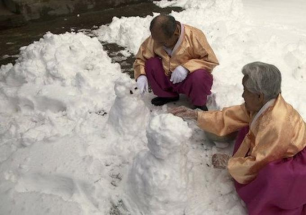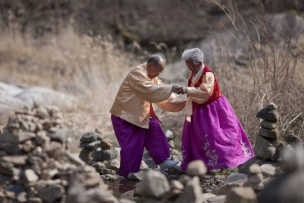If you’ve read any of my takes on French films, you’re familiar with that point where I describe something that happens and say, “I know, so French, right?” Because there’s always that moment when there’s a scene—typically a sex scene—that you just wouldn’t see in an American film (or films of most other nationalities). Korean films often have that moment, too, but it’s not from any particular event. It’s just when awareness dawns that you’re seeing something not quite like you’d see from another nationality.

The sex scene in THIS movie was a real shock.
My Love, Don’t Cross That River is a Korean documentary, and I had that moment somewhere in the first act, when I realized there wasn’t going to be any narrator, nor any interviewer per se. This evokes so strongly to me movies like Kim Ki Duk’s Spring Summer Winter Fall and Spring, and 9-Iron, and even sections of The Wailing and various version of The Housemaid, that I just had that “This is so Korean” moment. (I probably don’t have enough knowledge of Korean films to make that call, though.)
This is the story of an elderly nonagenarian couple who have been together for over 75 years, but not really their whole story, just the last few months of it. Because it’s also a story of the 98-year-old husband dying. (And sort of weirdly, with the doctors saying they have medicine for his cough, but it won’t help him because he’s old. Maybe that’s a real thing, but it smacks of socialized medicine rationing to me.) We get their past life through the ripples, like occasional reminiscences and their children (who are full of the angst of middle age) and, for example, a very touching segment about buying clothes for the children who didn’t make it.

Do you want to build a snowman?
While clearly this edited for a particular effect, and with some very effective music that kind of sneaks up on you, it still has a very clean overall feel. I always feel dumb writing about a movie that itself has very little dialog, so let’s get right to the scale:
1. Subject matter. Is it important? I don’t know if “important” is the right word. Like a lot of great documentaries, it’s supremely personal but in such a way that it reflects on humanity generally. The last moments before death-do-us-part, especially after such a long relationship, have a kind of significance our little motions in life do not, and it’s kind of an illustration of that.
2. Style. Professional, but very spare, in that Korean way I was mentioning. We don’t leave the here and now. That means you really have to be interested in these people, and for their general humanity and the sort of interest one has for someone who’s lived nearly a century.
3. Bias. Bias is the wrong way to look at this, though I noticed that some of the few critics who didn’t like it looked at it exactly that way. They objected to the presence of the documentarian, or accused him of romanticizing or sentimentalizing his subjects. I didn’t see it that way. It is kind of a celebration of marriage and staying together, but only if you want to take it that way. There’s a lot of history between these two people and we barely see it at all, and it probably wasn’t all good. So, the bias then, is in not showing that, I guess.
I watched with much the same enchantment I did as Spring, Summer, Winter, Fall…and Spring: It is what it is, in that most Buddhist sense of things. Any evaluation you put on it has an effect of changing what it is, and it’s something that should be taken exactly as is. Those people did those things and acted in those ways. And that is all.
The Boy liked it but was not enamored of the Korean-ness I’ve been talking about.

Literally crossing the river exactly like I asked you NOT to.
